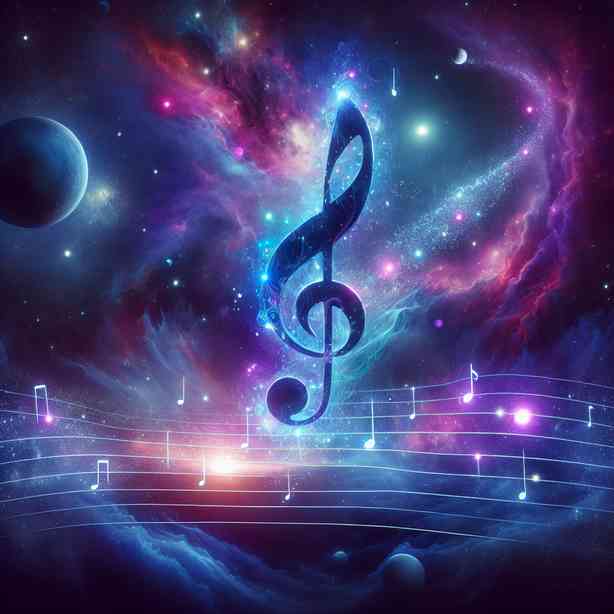
Music has always been a medium that transcends earthly boundaries, and when it comes to depicting the vast expanse of outer space, certain genres and styles evoke feelings and images that are out of this world. The idea of music that sounds like outer space might evoke thoughts of echoes and harmonies that resemble the very fabric of the universe. In this narrative, we will explore how different musical elements, genres, and artists capture the essence of outer space, creating an auditory experience that can transport listeners to the furthest reaches of the cosmos.
To begin with, one must consider the characteristics that differentiate “space music” from other genres. Typically, space music leans towards ambient, electronic, and experimental styles, favoring sustained tones, drones, and innovative soundscapes over conventional structures. Artists who have embraced this genre often use synthesizers, tape loops, and field recordings to generate sounds that resonate with the mysteries of the universe. These elements combine to create a tranquil yet expansive feeling, resembling the silent void of space or the serene beauty of celestial phenomena.
A pivotal figure in the genre of space music is Brian Eno,who is often credited with popularizing ambient music in the 1970s. His albums, notably “Ambient 1: Music for Airports,” are rich with atmospheric textures. While not explicitly about space, Eno’s work embodies the kind of sonic landscape that mimics the infinite spaces between stars and planets. The use of soft, flowing synthesizers and minimalistic instrumentation draws the listener into a calm state, akin to floating in zero gravity while contemplating the cosmos.
In stark contrast to Eno’s subtlety, the musique concrète movement—pioneered in the mid-20th century—embraced found sounds and manipulated recordings, offering a more fragmented representation of space. Composers like Pierre Schaeffer and later artists like Stockhausen used electronic manipulation to create complex sound collages that evoke the chaos and beauty of the universe. Their work often challenges the listener to find harmony within dissonance, much like understanding the nature of the universe itself, which is both orderly and chaotic.
Moving towards contemporary artists, we encounter the likes of The Black Mages, a band formed by Nobuo Uematsu, known for its work on the Final Fantasy video game series. Their music is heavily influenced by both orchestral components and electronic music, creating a celestial atmosphere that lends itself to imagery of adventure in space. Tracks such as “Dancing Mad” incorporate sweeping melodies with intense dynamics, reminiscent of the epic journeys through galaxies.
The concept of space music is further explored through soundscapes in film scores. Composers like Hans Zimmer and John Williams have created iconic soundtracks that characterize the vastness and drama of space exploration. Zimmer’s score for “Interstellar” is particularly noteworthy; it employs organ music that evokes the ethereal quality of outer space, combined with powerful orchestral crescendos. The use of unique timbres and rhythms reflects the emotional journey of the characters as they traverse the universe, drawing audiences into their deep connection with the cosmos.
Not to be overlooked, various genres expand on these themes and import elements of space music into their own identities. Progressive rock bands like Pink Floyd, known for their conceptual albums, utilized experimental sound techniques to explore ideas of existence and the universe. Their pivotal work, “The Dark Side of the Moon,” features tracks interspersed with cosmic themes and synthesizers that evoke drifting through the firmament. The album is timeless, transcending generations and remaining relevant as it continues to resonate with new listeners pondering the mysteries of existence.
Additionally, the realm of electronic music continues to thrive in its exploration of cosmic themes. Artists like Tycho and Moby incorporate lush synthesizers and organic sounds to create listening experiences that are dreamy and introspective, engaging the listener’s imagination to conjure up images of distant stars and swirling galaxies. Tycho’s “Awake” album exemplifies this blend of electronic and natural sounds, inspiring calm and contemplation akin to gazing at the vast night sky.
As we navigate this sonic journey through the cosmos, it is essential to acknowledge the cultural significance of space-themed music. This genre creates a common ground for exploration and understanding of the universe, transcending barriers of language and geography. Festivals like the “Cosmic Convergence” bring together artists and enthusiasts who celebrate the connection between music, sound, and the mysteries of the universe. Such events promote a shared experience, where individuals immerse themselves in cosmic sounds while enjoying visual displays that mirror the mesmerizing qualities of the galaxy.
Moreover, music that resonates with space invites contemplation on our place within the universe and the enormity of existence. The sounds can serve as a reminder that while we are a small part of an expansive universe, our thoughts and creativity have the power to reflect its grandeur. Listening to such music can elicit a range of emotions—wonder, nostalgia, curiosity—all while inviting moments of introspection and peace.
In conclusion, music that sounds like outer space encapsulates the essence of exploration, creativity, and human curiosity. Artists and composers have woven together elements from various genres to evoke imagery and emotions that resonate deeply with the celestial experience. The ambient sounds, electronic textures, orchestral scores, and experimental compositions all create a rich tapestry of sound that invites listeners to journey through the cosmos. Whether through listening to classic ambient albums, diving into film scores, or engaging with contemporary electronic artists, one can certainly find themselves lost in the soundscapes of the universe. This auditory experience transcends the mundane, reminding us of the profound beauty that exists beyond our earthly realm. So, as you close your eyes and let the music envelop you, embrace the exploration and wonder that comes with it, for who knows where your imagination might take you in the endless expanse of space.


